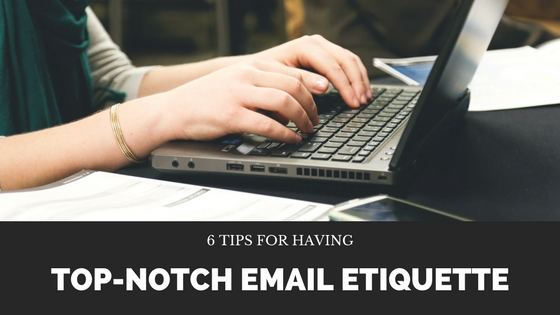In my recent blog post, The Importance of Email Etiquette, I covered just why you should be concerned with how you write your emails when it comes to business, particularly in sales. You’re making a first impression on someone, representing your company, and often trying to convince them to purchase some kind of product or service from you. In order to accomplish your goal, you need to send fantastic emails that are clear, concise, and standout. Here are some great email etiquette tips you can use in professional or personal emails.
Use proper grammar
A huge issue when sending formal business emails is that many people do not take the time to read over their email and make sure they’re using proper spelling and grammar. Avoid using slang or making simple spelling errors; simply reading over an email once is often enough to catch these small mistakes. While sending a quick email to your coworker may not be a huge issue if you forget to include, sending out sloppy emails to potential clients can certainly prevent them from patronizing your business.
Make it easy to understand
No matter who you’re emailing, they’ll want to receive an email that’s easy to understand. Avoid using too much technical language and make explanations as simple as possible. Listing your questions or comments using bullet points can often make a lengthy email easier to understand. Sending a clear and concise email makes it more likely that you’ll receive a positive response.
Add a personal touch
When sending out sales emails, this step can be particularly helpful. Adding some warmth or a more personal questions, such as how someone’s day has been going or how their recent vacation was, is a great way to open emails. You want to avoid being too personal, but a unique touch that lets your recipient know they’re receiving an email from a real person can help aid in communication.
Think before sending
Sometimes, you’ll get terse emails and you’ll be tempted to respond right away. Other times, you’ll want to send a lengthy or unnecessary email. If you’re going to send an email based on emotion or that doesn’t have a clear purpose, take a few minutes to step back, complete another task, and then decide if your email really needs to be sent or if you should word it differently.
Create a clear subject line
Your email recipient is going to want to know what the email is about, especially if it’s one they aren’t expecting. Make the subject line a clear indication of what the body of the email is going to be about. If you’re sending a sales email, try to create a unique and intriguing subject line that actually makes someone want to open and read the email.
Look over attachments
If you’re sending an email with attachments, make sure they’re the correct files before sending the email. The last thing you want is to send a private document to a coworker or client who isn’t meant to see it. Give your files clear names so you avoid accidentally attaching something you don’t want your recipient to see.

